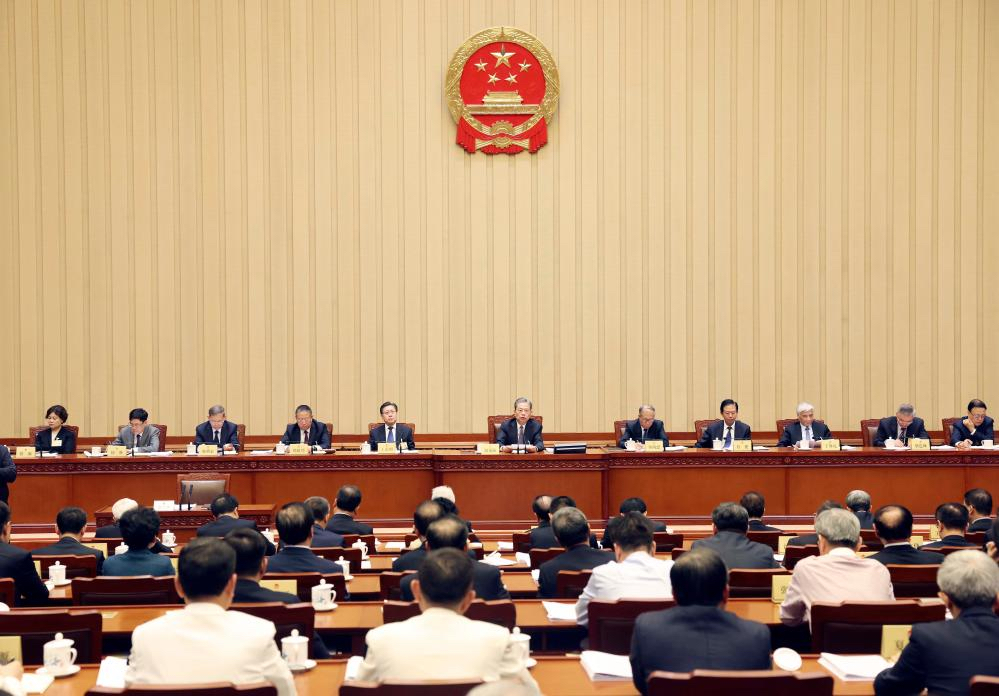High-level firings, Patriotic Education Law, and economic measures announced by China’s legislature
Former defense and foreign ministers Li Shangfu and Qin Gang have finally been officially cashiered, a new law is on the books to root out “historical nihilism,” and Beijing seems set to release new stimulus funding.

The sixth session of the Standing Committee of the 14th National People’s Congress (NPC), China’s legislative body, concluded yesterday in Beijing after five days of meetings. Two new, notable pieces of legislation were passed: a revised Marine Environment Protection Law and the Patriotic Education Law. There were also announcements of several official government appointments and removals.
The NPC convenes only once a year in March for two weeks to rubberstamp new legislation, but the Standing Committee — chaired by China’s top legislator (usually third in rank behind the general secretary of the Party and the premier) and currently consisting of 159 members — meets every two months to draft and approve new legislation. The current chairperson of the NPC Standing Committee is Zhào Lèjì 赵乐际, a current member of the Chinese Communist Party (CCP) Politburo Standing Committee, the seven-member top leadership group. Zhao is the former secretary (2017-2022) of the Central Commission for Discipline Inspection, the Party’s top anti-corruption body.
New legislation
At the end of yesterday’s proceedings, Xinhua reported that the legislators voted to adopt two new pieces of legislation: a revised Marine Environment Protection Law and the Patriotic Education Law. The original Marine Environment Protection Law originally came into force in March 1983 and has been revised four times, the last time in 2017. The latest revision increases environmental monitoring and imposes more stringent penalties for violations of marine conservation, while mandating that governments above the county level in coastal regions set up institutions to monitor and clean up marine waste.
The Patriotic Education Law, which will take effect on January 1, 2024, includes stipulations regarding patriotic education for various groups of people and “covers areas such as ideology and politics, history and culture, national symbols, the beauty of the motherland, national unity and ethnic solidarity, national security and defense, and the deeds of heroes and role models,” according to Chinese state media. It outlines responsibilities for central and local government departments and in schools and for families, as well as for “various groups of people,” including “compatriots from Hong Kong, Macao and Taiwan, and overseas Chinese.”
According to Xinhua, “some people are at a loss about what is patriotism,” and the law was implemented “amid public expectations to promote patriotic education, which is facing challenges including the influences of some social thoughts, such as historical nihilism, in recent years.” Historical nihilism (历史虚无主义) is a phrase used in China to describe any public doubt or skepticism about the Chinese Communist Party’s description of historical events.
The Patriotic Education Law is just the latest assault on historical nihilism in Xí Jìnpíng’s 习近平 China. In 2013, “historical nihilism” was one of seven “erroneous trends and ideas” denounced by an internal communiqué — known as “Document no. 9” — circulated by the Party’s General Office. In January 2013, shortly after Xi became General Secretary, he delivered a speech to the Party Central Committee in which he directly attributed the fall of the Soviet Union to historical nihilism. In 2018, the NPC Standing Committee passed the Heroes and Martyrs Protection Law that made it a criminal offense to defame China’s revolutionary heroes and martyrs — seen as a key attack on historical nihilism.
The full text (Chinese) of the Patriotic Education Law was published on page five of today’s People’s Daily.
Hirings and firings
At the NPC Standing Committee’s closing meeting, legislators voted on official appointments and removals. These included the former defense minister Lǐ Shàngfú 李尚福, who went missing in August, and former foreign minister Qín Gāng 秦刚, who was removed from his post in July without explanation. State media reported that Li was removed from the posts of state councilor and defense minister, and Qin from the post of state councilor. Li was also removed from the post of member of the Central Military Commission.
There has still been no official explanation for the firings of Li and Qin, and they are both still among the 205 members of the 20th Central Committee of the Communist Party who were elected at the 20th National Congress in October 2022. Li and Qin might be removed from these positions at the Third Plenum of the Central Committee that will take place in late 2023.
Li’s official dismissal comes just days before an international security conference, the Beijing Xiangshan Forum, set to take place in China on Sunday and to which the U.S. defense department is sending a delegation.
Other dismissals announced yesterday include Wáng Zhìgāng 王志刚 from the post of minister of science and technology, and Liú Kūn 刘昆 from the post of finance minister. Wang is replaced by Yīn Héjùn 阴和俊 and Liu by Lán Fó’ān 蓝佛安, a technocrat with little central government experience.
Other new appointments that were announced include new ambassadors to Mongolia, Timor-Leste, the Republic of Congo, Liberia, Slovakia, Serbia, and Spain and Andorra.
Economic measures
The NPC standing committee also approved the issuance of more sovereign debt this year as part of adjustments to the annual budget, and for the State Council to approve in advance the ceilings on some newly-incurred local government debt. The central government will issue a trillion yuan ($136.80 billion) in additional government bonds in the fourth quarter to support the rebuilding of disaster-hit areas.
The new issuance is estimated to increase China’s 2023 fiscal deficit ratio from 3% to about 3.8%, which, according to Global Times, is “high in historical terms” but appropriate because “special times call for special measures.” In 2020, China issued a trillion yuan of special treasury bonds to fund stimulus spending, and a further 750 billion yuan in 2022.
Earlier today, Zhū Zhōngmíng 朱忠明, China’s vice minister of finance, stated at a press conference, “After the treasury bond funds are put into use, it will help drive domestic demand and further consolidate the recovery of the economy.”
Analysts cited by Reuters expect Beijing soon to inject fresh fiscal stimulus to shore up the economic recovery, but worry that reverting to debt-funded stimulus could undermine consumer-led growth.






